
February 28, 2019, by Liz Goodwin
University News Review — February 2019
The University’s Press Office saw many top stories hit the headlines in February…
A fish called Mary
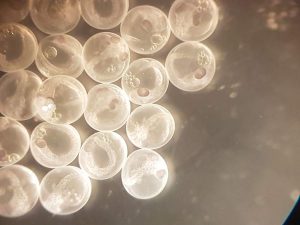 The story about a female stickleback fish, nick-named Mary, which left scientists baffled after appearing to become pregnant without a mate, made national headlines this month.
The story about a female stickleback fish, nick-named Mary, which left scientists baffled after appearing to become pregnant without a mate, made national headlines this month.
The Telegraph, The Times, The Guardian, iNews and the Mail Online all reported that the female ‘virgin’ stickleback — who was collected on an expedition to the Outer Hebrides by researchers at the University — had produced offspring from eggs that appear to have been fertilised while they were still inside her.
Working with academics from the School of Life Sciences, Emma Rayner, Media Relations Manager for Medicine and Health Sciences, promoted the story which first appeared as a paper in the journal Scientific Reports.
Dr Laura Dean, said: We were astounded at what we found when we examined Mary in our lab in the Hebrides. She looked like an ordinary egg-bound fish so we couldn’t believe it when we found she had almost completely developed embryos inside her ovaries. This is pretty much unheard of in an egg laying species.”
A new politics?
 What happens when a political party splits? So far 11 MPs have resigned from Labour and Conservative parties — including Broxtowe MP Anna Soubry — and formed the Independent Group. They say Brexit was the catalyst for this and they want a “fresh way of working with no hierarchy.”
What happens when a political party splits? So far 11 MPs have resigned from Labour and Conservative parties — including Broxtowe MP Anna Soubry — and formed the Independent Group. They say Brexit was the catalyst for this and they want a “fresh way of working with no hierarchy.”
Professor Steven Fielding of the School of Politics and International Relations, who has written extensively on the Labour Party and is currently working on a BBC Radio Four documentary called ‘Breaking Up the Party,’ discussed the recent splits.
Speaking on BBC News and BBC Radio 5 Live, shortly after the ‘Gang of seven’ split from Labour, he said: “The split doesn’t come as a surprise to me. I don’t think it does to anybody. With the consolidation of Jeremy Corbyn’s leadership in 2016, there would be some people in the Labour Party who would eventually decide it really wasn’t the party they had joined, and when you add on the anti-Semitic issues and anti-Brexit disagreements, there are a number of things coming together.”
Professor Fielding also went on to write an Op Ed for The Times ‘Red Box’ on the prospects of the newly formed Independent Group.
ISIS bride Shamima Begum and her quest to return to Britain
 Topical debate continued over the fate of Shamima Begum, the British teenager who left London to join Islamic State. She was 15 when she left her home and is now in a refugee camp in Syria, where she gave birth to a boy this month.
Topical debate continued over the fate of Shamima Begum, the British teenager who left London to join Islamic State. She was 15 when she left her home and is now in a refugee camp in Syria, where she gave birth to a boy this month.
The 19-year-old called on the British people to have sympathy for her and asked to be allowed to return to the UK, but the Home Secretary Sajid Javid ordered she be deprived of her British citizenship.
Media Relations Manager for Social Sciences, Charlotte Anscombe, worked with Dr Afzal Ashraf of the School of Politics and International Relations, arranging interviews from the University’s Globelynx Studio, on the debate which has been sparked by Begum’s request to come home.
Speaking to the international broadcaster ABC Australia News, Dr Ashraf said: “It’s a burning issue that goes beyond the case of this individual woman and her child.” Asked whether individuals like her need to be viewed differently — as young women who have been lured into this way of life, some of them quite naively — Dr Ashraf said; “I think that many of these people can be classed as victims, but that doesn’t preclude the fact that they’re also potentially dangerous.”
Remembering Dr Stewart Adams
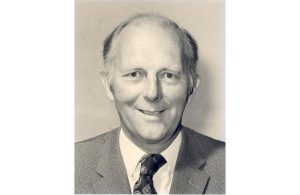 The University was sad to learn of the recent passing of the renowned chemist and pharmaceutical scientist Dr Stewart Adams at the age of 95. The discovery of ibuprofen in the 1960s by Dr Adams and his colleagues at the Boots Laboratories in Nottingham marked a turning point in non-steroidal anti-inflammatory drug design.
The University was sad to learn of the recent passing of the renowned chemist and pharmaceutical scientist Dr Stewart Adams at the age of 95. The discovery of ibuprofen in the 1960s by Dr Adams and his colleagues at the Boots Laboratories in Nottingham marked a turning point in non-steroidal anti-inflammatory drug design.
The Guardian and The Telegraph both ran an obituary for Dr Adams and revisited his strong connections to both the University of Nottingham and to Boots.
In an article on BBC News Online, Professor Kevin Shakesheff, Pro-Vice-Chancellor for the Faculty of Science, said Dr Adam’s career and contribution to patients was “inspiring.”
“He is remembered for his successes in creating one of the most important painkillers in the world, but as with many inspirational people, he had to bounce back from failures in earlier clinical trials before he and his team created ibuprofen. His life is a reminder to everyone in Nottingham that we can change the world through the work we do in our local companies, hospitals and universities,” said Professor Shakesheff.
Leonardo da Vinci: A Life in Drawing
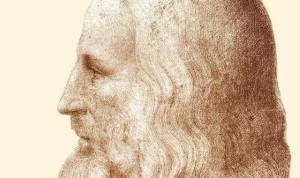 In February 2019, to mark the 500th anniversary of the death of Leonardo da Vinci, 144 of the Renaissance master’s greatest drawings in the Royal Collection will go on display in 12 simultaneous exhibitions across the UK.
In February 2019, to mark the 500th anniversary of the death of Leonardo da Vinci, 144 of the Renaissance master’s greatest drawings in the Royal Collection will go on display in 12 simultaneous exhibitions across the UK.
The Conversation and the Times of Malta featured an article by the University’s Gabriele Neher, Associate Professor in Art History, who wrote about this nationwide event — Leonardo da Vinci: A Life in Drawing.
Dr Neher reflects that: “To think of Leonardo as an Old Master — with all its connotations of being staid, traditional, somehow old-fashioned and boring — is to do this extraordinary man a grave injustice. There is nothing stale or predictable about a man whose personal foibles irritated and frustrated contemporaries as much as his brilliance and creativity dazzled and awed them.”
The event will give the widest-ever UK audience the opportunity to see the work of the extraordinary artist. 12 drawings selected to reflect the full range of Leonardo’s interests — painting, sculpture, architecture, music, anatomy, engineering, cartography, geology and botany — will be shown at each venue.
“So enjoy these drawings that have come down through 500 years of art history and appreciate that you are looking inside the mind of the greatest ‘Renaissance Man’ of them all,” said Dr Neher.
More information on the exhibitions can be found here.
Filming on Campus
Jimmy Doherty and a very, very, very long snack
Filming on campus this month saw television presenter Jimmy Doherty visit the University’s School of Biosciences to make the longest potato snack!
The experiment — made for Channel 4’s prime time series Food Unwrapped — looked at the function and importance of starch in snack foods.
Food Unwrapped, which has seen viewing figures peak at 2.9 million, explores the clever, ingenious or high-tech production methods used to make some of our favourite food products. The programme features some of the scientific methods used in modern food production, some of which viewers may find surprising or fascinating, in order to give people a greater understanding of how popular mass-produced food products are made for the consumer.
Working with food science students at the University’s Sutton Bonington Campus, Dr Jo Gould, Assistant Professor in Food Science, and Media Relations Manager for Science, Jane Icke, welcomed Jimmy and the Food Unwrapped team, to complete the experiment.
Jimmy said: “Such an amazing university training the next generation of food scientists.” See his Instagram video here.
No comments yet, fill out a comment to be the first

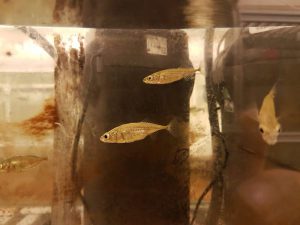
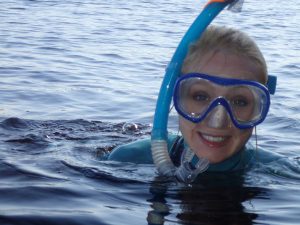
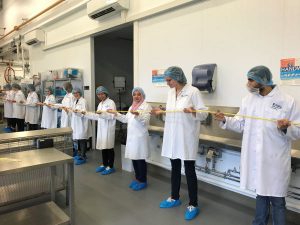
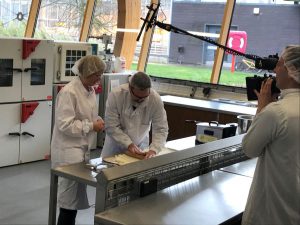
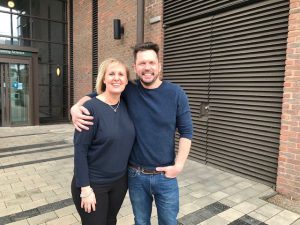
Leave a Reply